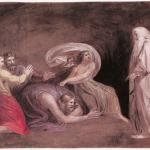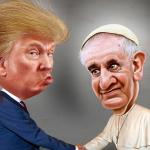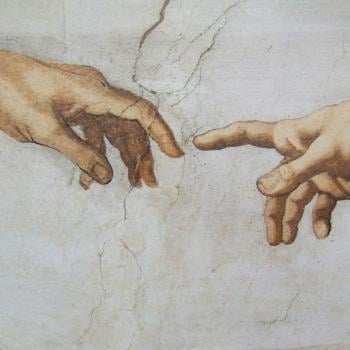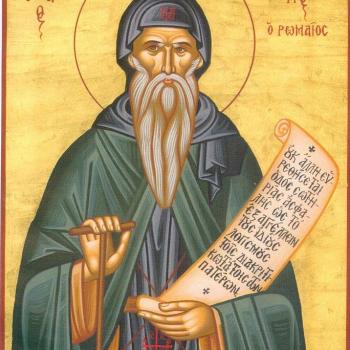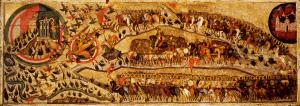 Some people want to reduce Catholicism into a monotonous, monotone belief system which has everyone act and think alike; they treat the doctrines of the faith like programming code, expecting one and the same result all around the world. What they like, what they desire things to be like, they think should be universally enforced, while what they do not like should be stopped. The Catholic ideal, to them, is one universal simulacra of their own thoughts and desires, replicating what they believe happened in a bygone golden age.
Some people want to reduce Catholicism into a monotonous, monotone belief system which has everyone act and think alike; they treat the doctrines of the faith like programming code, expecting one and the same result all around the world. What they like, what they desire things to be like, they think should be universally enforced, while what they do not like should be stopped. The Catholic ideal, to them, is one universal simulacra of their own thoughts and desires, replicating what they believe happened in a bygone golden age.
They desire to go to any church anywhere, and see the exact same things happen, with the exact same expectations on all. Many of this mentality want all Liturgies to be done in Latin, and all the canon laws expressly followed without any merciful exemptions. Priests are celibate; families are large; women are veiled and men are strong, boldly going forth into the world, conquering it for Christ.
What? Some are suggesting married men should be allowed to be priests, and women should be allowed to be ordained deacons? Heresy, they think; it’s not Catholic, it’s Protestant. Why? Because it is not what happened in the golden age when men were men and women were silent. Obviously, the long history of married clergy, even in the West, and the continued presence of married clergy in the East is lost to them; obviously the history of women deacons in the East is lost to them; it isn’t Catholic because it is not the ideal they have set up in their mind, so it must be Protestant. Even if it is Catholic, it must be Protestant because it does not go with the image of what they think makes Catholicism unique. They have long defended the tradition of celibate priests in apologetics that they have turned it something more than a discipline fitting for a particular time and place, but have seen it as perfection itself (ignoring all the married priests who were also saints) – this indeed is a part of the problem of an apologetical culture which goes too far in its defense as it tries to make too many claims about a particular practice or discipline as if it was the best of all possible disciplines (when, of course, all discipline should serve the people and their particular needs and not the other way around, for, as Jesus said, the Sabbath was made for us).
Just a cursory glance of history and the variety of ways the Catholic faith has been lived out should show why there is no one way of being Catholic, no one set of disciplines which are universal and fit for all times and places, and there is no reason to scream in defiance as if changes in discipline are indicative of unseemly outside influences (such as Protestants). Catholicism, at its root, and at its best, is an all-embracive tradition, taking all that is good and true and beautiful in the world, bringing them together and giving them a home. Catholicism is able to appreciate a wide variety of practices, spiritualities, theologies, philosophies, and cultural adaptations, so that to look for a Catholic imagination, or a unique Catholic spirit, is to look for the transcendent expanse which can be encountered in a diverse variety of ways. It is a plurality which is able to be joined together as one, instead of a monistic oneness which tries to make a particular universal.
We should not look at one kind of liturgical practice (such as the Tridentine Liturgy), one particular spirituality (such as the Ignatian tradition), one particular theology (like Thomism), one particular philosophy (like Aristotelianism), one particular culture (Europe) and try to declare that is what Catholicism is about and anything which differs becomes less than Catholic and therefore “Protestant.” This is especially true in regards to various disciplines, which come and go throughout the centuries. At one point it was universally expected that all would stand on Sunday (as Canon 20 of Nicea required), but as new cultures and ways of thought came into contact with the Christian faith, kneeling became an acceptable practice as well. And so, if there is a change of discipline, even if it seems radical such as allowing married men become priests in the Latin Rite, this must not be seen as a denial of Catholicism and its unique heritage, but rather a new development and reengagement with its greater tradition for the needs of the people today. Likewise, if Catholics are interested in non-European cultures, and they want to embrace those cultures, they must not be made to feel they have abandoned the Catholic faith. Native American traditions can lead to their own particular embrace with the holiness of God, with the incarnation, using their own symbols and cultural appreciation to demonstrate the beauty of the kingdom of God.
Certainly, there are elements of the Catholic faith which are universal which must be found in all the expressions of the faith. God became man and revealed himself to humanity in a particular time and place; while much of what developed in the early Christian setting can be seen taking on elements from its own cultural milieu, there are elements which transcend the culture, such as the sacraments which bring us into the Church and preserve us in grace. Baptism, chrismation, the eucharist, confession, priestly orders, marriage and unction might be able to be celebrated in a variety of ways, but the central core must be kept in the celebration. Tobacco could be used instead of incense, dancing could play a more central role in Sunday worship, but the center of ecclesial being in the eucharist, in the body of Christ, is to remain; it is the core liturgical celebration which ties the whole body of Christ together as one, allowing for their diversity and yet union in the communion of love.
Catholicism is not tied to one way of being; it is about the full embrace of the human condition and all that is possible within it, allowing each person the freedom to come to their own without a legalistic expectation as to how all people should be to be a Christian. Plurality of spiritual and religious traditions within the Church, as Nicholas of Cusa understood, actually encourages Christians to better themselves and their relations with God. If Catholicism was some sort of static monism, with only one way to express the faith, many will find their own spirit becoming imprisoned as they try to embrace and follow someone else’s expectations which do not fit their own needs.
There is no one form of practice, one discipline, which is to be embraced by all, because we are all different; if we are allowed to thrive and be ourselves instead of following what is needed by someone else, we will find the grace which is given perfects our personal nature while if find ourselves following and imitating others, that grace will be strangled by the poison of legalism. The spirit gives life and freedom, while the letter of the law, ordained after one or another appropriation of the faith, will end up cutting the spirituality of many, leading to their spiritual death. “There is therefore now no condemnation for those who are in Christ Jesus. For the law of the Spirit of life in Christ Jesus has set me free from the law of sin and death” (Rom. 8:1-2 RSV).
This is not to say the faith is a relativistic free for all; it is all about building upon the foundation of the pillar and ground of the truth. It must stand with that foundation; that which is closed off from the truth, that which is ugly and unholy, insofar as it is ugly and unholy, has no place with the church, for such material will easily crumble apart. The Christian faith does not preach a relativistic free for all, but rather, it is the expression and engagement with the truth of revelation, of the truth of God, where all that which is good and true has a place. If we try to limit the faith to one form, one practice, a lot of truth, a lot of the good which God created and instilled in the world and her cultures, would be lost and the fullness of God’s plan will be hindered; but on the other hand, if something outright contradicts the goodness and truth of the faith, where that contradiction lies, there needs to be metanoia and purification, then what is left can be filled by grace and perfected, able to have a place within the body of Christ.
It is not always easy to tell what is acceptable and what is not when the church is brought to a wide range of cultures and it seeks to proclaim the truth of Christ in new settings. The process is going to be slow, and sometimes crude; but if grace is allowed to take hold and help with such development, it will slowly produce another beautiful addition to the body of Christ and is worthy of being accepted even if it is different from what other Catholics have experienced in the past. We must not reduce the faith to the dead letter of the past; instead, we must enlarge it with the work of the Spirit of Truth guiding us forward, knowing that the gates of hell will not prevail. When we get caught up in particular past expressions, trying to force them to remain without change, that will only cut off grace as it will stop the development of the kingdom of God and its multifaceted representation on the earth. Everything in time changes. It’s how growth and purification are possible.
[Image= Blessed Be the Host of the King of Heaven by Anonymous, attributed to Athanasius [Public domain], via Wikimedia Commons]]
Stay in touch! Like A Little Bit of Nothing on Facebook


